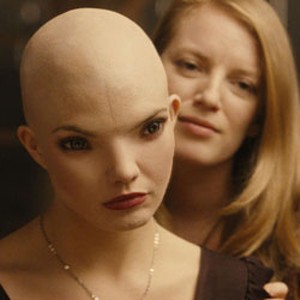Published June 9, 2010 at 5:44 a.m.
The week that brings us Seven Days’ Parenting Issue also brings us Splice, and that could be viewed as a fortuitous coincidence or an instance of cosmic irony. You see, writer-director Vincenzo Natali’s film, which appears from its trailers to be an Alien-like scare flick, is actually about parenthood.
Well, sort of. Be warned that this is a film you really don’t want to see with your mom, dad or offspring. If you don’t cotton to the special Canadian blend of mad-scientist motifs, poignancy and B-movie camp that David Cronenberg peddled back in the days of The Brood, you may not want to see it at all. And if finding yourself bursting out laughing at should-be-disturbing plot twists is never something you enjoy at the movies, I advise giving this one a pass.
But if that description wasn’t enough to scare you off, here’s more: Adrien Brody and Sarah Polley play Clive and Elsa, a pair of cohabitating biochemists who are so cool they refuse to wear lab coats. They’re also so cool that, when the Big Pharma company bankrolling their research orders them to stop creating blobby genetic mutants and focus on practical applications, their response is to risk one last secret experiment — with human DNA thrown into the mix.
Never a good idea. Before you can say, “Mary Shelley,” the couple’s mutant “child” is scampering around the lab, chirping and keening. Within a matter of weeks the squirrel-like creature has grown into an intelligent humanoid (Delphine Chanéac) with the face of a melancholy silent-film actress, the tail of a scorpion and the legs of a goat. She’s one of a kind — and her teenage hormones are kicking in.
When Brody’s character tells Polley’s that “This was never about science,” he’s describing the film itself. Splice scarcely attempts to make its conceit plausible. Rather than straight sci-fi, it’s a fantastical riff on the Frankenstein tale (the characters’ names are shoutouts to the most famous film version) with the mad scientist as an irresponsible mom this time instead of a dad. Elsa is the dominant force in her partnership with Clive, in and out of the lab, but her relationship with “daughter” Dren is another story. As the film progresses, their initially tender bond mutates into something more along the lines of Mommie Dearest — if Christina Crawford had been armed with a lethal stinger.
All this is fertile ground for drama. And it might have generated something really interesting had writers Natali and Antoinette Terry Bryant fleshed out Elsa’s motivations, which appear to be tied to her own history with an abusive mother.
They should also have toned down the dialogue, which is purple enough to send both Polley and Brody into sporadic fits of overacting. In the end, the story’s potential becomes moot when the filmmakers remember this is supposed to be a horror movie and promptly take a wrong turn into a genre best described as “the ‘Jerry Springer’ episode taped in hell.”
Yet, before it turns seriously cuckoo, the film explores parenting a mutant in scenes that are oddly touching. Part actress, part makeup and part CGI, Dren resides firmly in what visual-effects artists call the “uncanny valley” — she’s just human enough to make us care about her and just inhuman enough to make our skins crawl.
Watching her keeps us vacillating among dread, disgust and empathy until Natali delivers his thriller payoff. By that time, Splice’s outré aspects have already alienated the horror audience, while its cartoonish moments have turned off the art-house crowd. The cult of Splice will be a stunted, doomed hybrid. But, all the same, I suspect there are enough people who remember their own mutant adolescence for one to emerge.
Info:
More By This Author
Speaking of Movies, movie Review
-

Next Month Brings the Final Curtain for Palace 9 Cinemas
Oct 27, 2023 -

Book Review: 'Save Me a Seat! A Life With Movies,' Rick Winston
Aug 30, 2023 -

Steve MacQueen Named Executive Director of Vermont International Film Festival
May 22, 2023 -

Vermonters Are Going Back to the Movies — Under the Stars
Aug 26, 2020 -

Where to Catch a Movie Near Burlington
Sep 11, 2018 - More »
Comments
Comments are closed.
From 2014-2020, Seven Days allowed readers to comment on all stories posted on our website. While we've appreciated the suggestions and insights, right now Seven Days is prioritizing our core mission — producing high-quality, responsible local journalism — over moderating online debates between readers.
To criticize, correct or praise our reporting, please send us a letter to the editor or send us a tip. We’ll check it out and report the results.
Online comments may return when we have better tech tools for managing them. Thanks for reading.












































